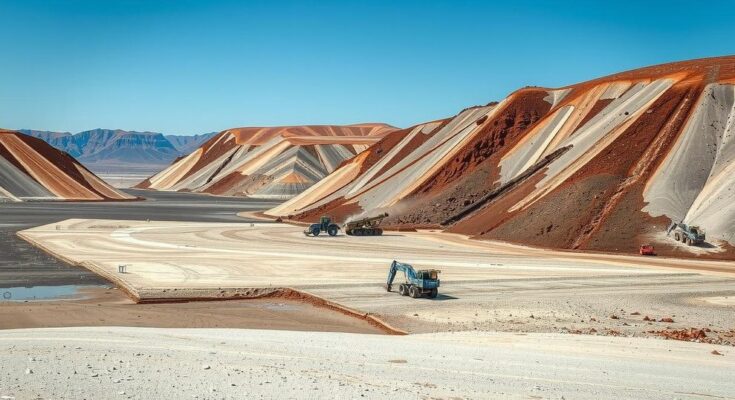In Zimbabwe, the surge in lithium mining for electric vehicle batteries is endangering local communities’ grazing and water rights. The government’s authority to expropriate land and the lack of significant compensation for affected residents are critical issues. Local communities are expressing concerns over environmental impacts, calling for better protections amid rising demands for these crucial minerals.
The demand for lithium, crucial for producing electric vehicle batteries and household solar power systems, is outpacing regulation in Zimbabwe. Several lithium mines, including those in Mandihongola, Gwanda, Sandawana in Mberengwa, and Arcadia in Goromonzi, are established within communal lands, raising concerns about local rights. The predicament is compounded by the government’s authority, under Section 324 of the Mines and Minerals Act, to expropriate land for extraction, often without fair compensation to local communities.
In Gwanda district, lithium deposits overlap with long-inhabited communal areas like Garanyemba, putting the future of generations at stake. Basic needs such as water and grazing land are under assault from mining activities. The indigenous inhabitants are left with little recourse, facing displacement and insufficient compensation, while their grazing lands are repurposed for mining interests.
Moreover, the issue enters a complex intersection with international human rights law, although explicit rights to land are often ambiguous. Local Rural District Councils hold some power to manage land usage, which can conflict with decisions made by traditional leaders, leaving questions about local governance structures and protections for indigenous rights. The absence of clarity from government agencies, including the Ministry of Mines and the Environmental Management Agency, concerning the impacts of lithium mining raises alarms over the safety of water resources and grazing areas.
Members of the Mandihongola community are voicing concern as mining companies, particularly the Chinese firm extracting approximately 1,000 tonnes of lithium per day, are reported to be polluting local water sources crucial for livestock. This environmental distress threatens not just the bearing of wealth—livestock—but the very fabric of community life that relies on these resources.
There has been no official confirmation from the Environmental Management Agency regarding inspections of mining operations or measures taken to safeguard local grazing and water rights. The lack of communication from officials including the Minister of Environment, Climate and Tourism is troubling, suggesting a disregard for local voices until potential catastrophes unfold.
Zimbabwe faces ongoing challenges like land degradation and water pollution from both artisanal and large mining companies, further exacerbating the situation for rural communities. While legislation exists to penalize polluters under the Environmental Management Act, the capacity of rural populations to enforce compliance is limited.
The absence of effective rehabilitation plans for lithium mines adds to the urgency for communities to advocate for their rights and livelihoods. As the situation stands, a vigilant approach must be maintained to ensure that communal interests and environmental standards are not compromised in the face of aggressive mining activities.
In summary, the rise of lithium mining in Zimbabwe poses significant threats to local communities, particularly regarding their grazing and water rights. The government’s responsibilities, coupled with the actions of mining companies, are creating a precarious situation for these vulnerable populations. As communities like Mandihongola raise their voices, it becomes increasingly clear that there needs to be a balance between resource extraction and the rights of indigenous peoples. Without action and oversight, the risk of environmental degradation and erosion of local livelihoods will only escalate.
Original Source: www.newzimbabwe.com




